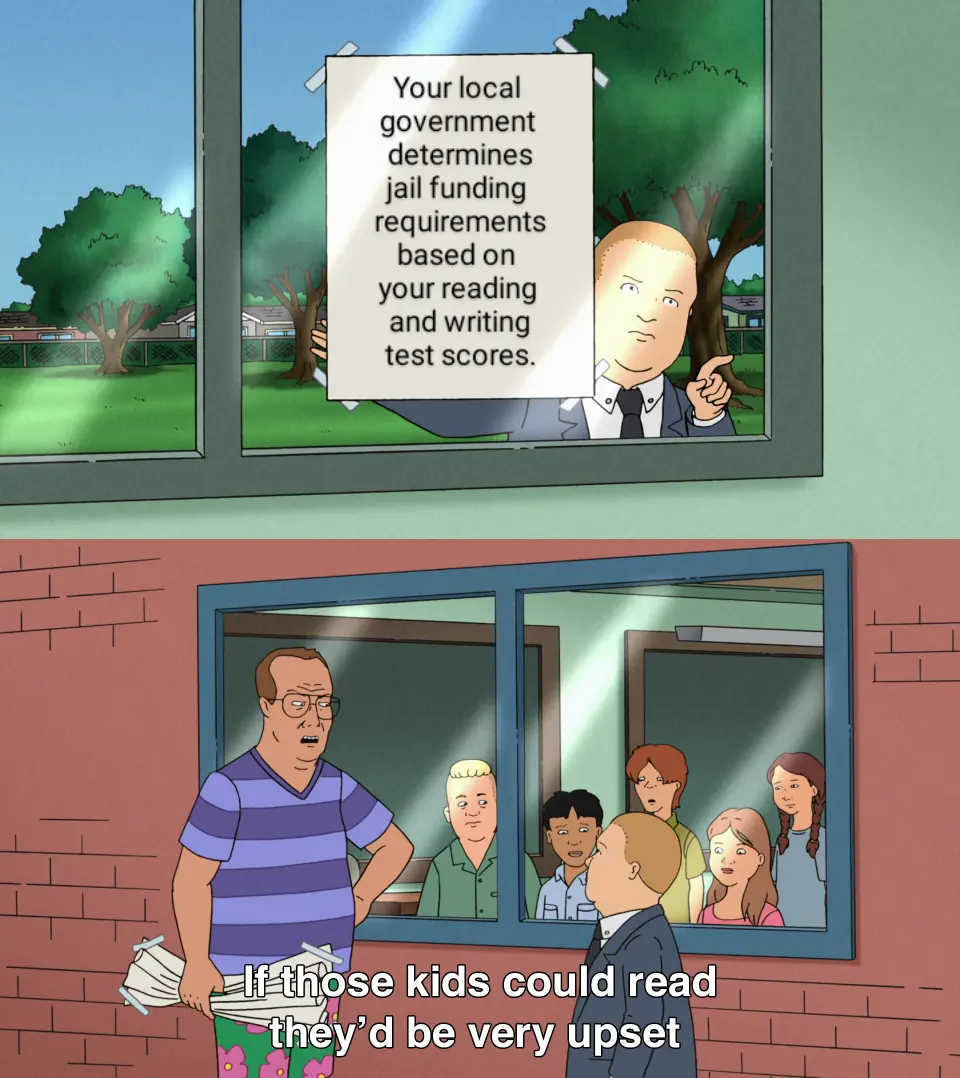- cross-posted to:
- [email protected]
www.thenationalliteracyinstitute.com
- cross-posted to:
- [email protected]
To determine how many prison beds will be needed in future years, some states actually base part of their projection on how well current elementary students are performing on reading tests
Wow. That’s depressing.
Land of the Free 🇺🇸 World Incarceration Rates If Every U.S. State Were A Country

Such shock, 😯 as I read through and count the south states vs the north states. 9 of the top 10 jailers are southern states. I will bet that close to 8 in 10 of the people imprisoned are Black or Latino so that the 14th amendment stopping slavery except in the case of those in prison is keeping the southern traditions of slavery alive and well.
I am so glad I got two college degrees simultaneously and was then overworked by the private sector so badly I had a mental breakdown and was then misdiagnosed for years and can now never enter the workforce in my given field due to missing half a decade of work.
Now I get to be told by literal, actually illiterate morons to focus on my grindset and have a positive outlook, whilst browsing through ghost (fake) job applications that all have 200 applicants and a 4 month interview process.
… I’d been saying the average American has a 6th or 7th grade reading level.
Now it looks like I gotta knock that down to 5th or 6th grade reading level.
EDIT: Somehow this does not exist in this thread yet:

When I designed store fixtures, the assembly instructions had to be written at a 3rd grade reading level, and even then were barely followed.
To me, this is the genius of Ikea instructions.
No words. None.
Just numbers.
Legos for adults.
If you cannot figure out how to assemble Ikea furniture, you’re too stupid to be trusted… basically at all, with any responsibility for anything, imo.
Literacy has played a large factor in advancements in societies and more important liberation of oppressed peoples. The fascists and greedy rich people have been doing everything to fuck with education for decades. And US citizens have been more or less taking pride in being stupid. The working and poor need to be doing everything possible to take pride in learning to combat this degeneration for our survival.
tldr?
More like TLCR.
I see what you did there
Audiobooks are becoming huge for accessibility purposes because of this phenomenon. People have already expressed appreciation for their inclusion in my Intro to Marxism reading list.
Audiobooks aren’t really a good solution to be honest. Reading / writing literacy are the basis of scholarship. We have centuries of research and examples that we’ve turned our back on that efficient learning happens only when you can unlock good literacy skills. Specifically the aspect of reading/physical writing/sublingualization is a cornerstone of comprehension of complex ideas. With something like Marxism that’s based on understanding both technical and archaic language and social constructs it becomes really hard. There are tons of self professed Marxists that couldn’t tell you what commodity fetishism actually means in simple terms.
Great example is the Communist Manifesto itself, meant to be a pamphlet for factory workers in the 19th century, but is typically a mildly difficult text to approach for the average person today.
Audiobooks can replace something like pleasure reading where you’re just reading pulp garbage, but they’re not really a good replacement for learning.
I don’t disagree that reading and writing are the basis of scholarship (as we know it), but I reject any suggestion that comprehending critical Marxist concepts should require a scholarly barrier of entry. If someone wants to become a theoretician then sure, it makes sense to analyse Marxist theory from primary sources with all its historical overhead, but if our goal is to promote efficient learning, then we shouldn’t be recommending archaic texts written for a whole different target audience. People don’t really need to learn French or German words to understand what the worker class and owner class are and their resulting material interests, or what alienation is. How many people need to know who exactly Kautsky was anymore? Can’t commodity fetishism be defined in simple terms? Archaic works absolutely still have value and relevance, but the Marxist ideas relevant to most workers can absolutely be made more accessible to your local audience while retaining its analytical value.
You’re talking from a relative position of understanding of these concepts. You’re not talking from a blank slate. Even in professional environments that I’ve been in where everyone went to college and theoretically is fully literate, you would have trouble getting people to retain these concepts even if you used friendlier technical language. You’re overestimating the amount of time it takes to actually achieve understanding, there are people on this site that constantly mix up these words and concepts, have a hard time applying them to the real world and misapply them regularly and are self professed Marxists. You’re also mistaking cultural policing of agreeing/using these concepts for understanding of them. Just think about how many people in America agree with capitalism but can’t adequately explain what capitalism is. They agree with freedom but don’t have a working definition or framework of what freedom means. On a societal level this often becomes bromides. My parents and grandparents read Marx in school but couldn’t give you an accurate basic run down of Marxist concepts.
Marxism isn’t some magical thing. There were plenty of people in the USSR that also didn’t understand the system they existed under and it’s concepts but reflexively or sheepishly agreed with it.
Why 📖 when 💃on ticktock 😭😭
50% of Americans read so poorly that they are unable to perform simple tasks such as reading prescription drug labels
Maybe they could start them off with something easier, like Finnegans Wake
Pre-requisite for switching to the Techno-Feudalism government type in Civ VIII.
And here I was proud my kindergarten child is participating in 2nd grade English. Now I realize everyone is just dumb.
The source seems extremely dubious with seemingly no way to see how they conducted the study and where they pulled the numbers from
, and some of the points are not very well worded especially in their 2024 study, there the first 2 lines are:“On average, 79% of U.S. adults nationwide are literate in 2024. 21% of adults in the US are illiterate in 2024.”Granted, English isn’t my first language but those statements just seem contradictory. “U.S. adults nationwide” and “adults in the US” seems like the exact same thing, unless someone can correct me.Turns out I’m the one who can’t read, thought both examples used “illiterate” rather than “literate and illiterate”Comment sections are also filled by bots so that doesn’t give that much confidence either.
If 21 % can’t read (are Illiterate) then it makes sense that 79 % can read (are literate). So yes, nationwide and in the US are the same thing.
Besides that, I agree. No sources is a no go and no moderated comments is a fucking biohazard.
If 21 % can’t read (are Illiterate) then it makes sense that 79 % can read (are literate). So yes, nationwide and in the US are the same thing.
Seems like I can’t read myself, I thought both said illiterate. My mistake.
No worries. I heard it a more common problem then one would think.
The so explains the conservative ascendancy. More morons for their electorate who uncritically swallow everything spoon-fed to them, less for the progressives on the left.
No sources in link.
Yeah because it’s primary research and this is a huge unaddressed and uncared about problem that’s only growing. The last National Assessment for Adult Literacy took place in 2003.
PIAAC (PROGRAM FOR THE INTERNATIONAL ASSESSMENT OF ADULT COMPETENCIES) which this is likely partially based on is typically who provides the survey data to these institutions.
Barbara Bush Foundation is another source that deals specifically with this.
A lot of this data is cobbled together because the government has practically defunded any studies of this issue. Literacy has effectively been taken for granted and hasn’t actually been upheld. Everyone in this space says more data is needed but isn’t optimistic that more data is going to paint a better picture of literacy (both in children and adults) in the US.
the new, potentially illiterate, president is on the record saying his approach to dealing with numbers that seem bad is to stop gathering or reporting the numbers. his plan for getting the trains to run on time is to simply say that they are, whether or not that’s true
If it was primary research then it should have methodology.
But since the data is “cobbled together” from other sources, then it’s by definition secondary research (and should list those sources).













